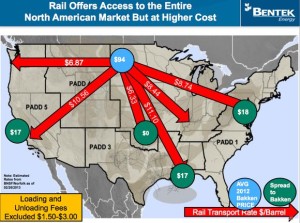Bakken Crude could be pushed out of the Gulf Coast refining market as soon as this year or early next year. That prediction was revealed by Bentek Energy Sr. Analyst Erika Coombs at the annual Benposium Conference in early June of 2014.
Production growth in the Eagle Ford Shale and Permian Basin, and nearly completed pipeline and infrastructure projects for the Permian, will make Bakken crude transport to the Gulf Coast uncompetitive according to Coombs. As a result, oil production from the Bakken is expected to primarily target the West Coast refining markets in Washington and California.
Although the destination for some Bakken crude volumes may be changing, how it will get there is not. Analysts at the conference said rail will remain the major source of transport for Bakken crude. Approximately 70% of Bakken crude arrives to market by rail.
Read more: Railroads Are Moving 70% of Bakken Oil Production
Currently, pipeline infrastructure in the Bakken is slim, but two new major oil pipelines have been proposed to serve the Williston, including the Double H Pipeline and the Sandpiper Pipeline. At the end of 2013, Enbridge Partners, the company that proposed the Sandpiper Pipeline, announced it reached an agreement with Marathon Petroleum to become an anchor shipper.
Read more: Enbridge's Sandpiper Pipeline Gains Anchor Shipper in Marathon Petroleum - Open Season
Highlights from Benposium 2014
- Rail will remain the primary source of transportation in the Williston Basin
- Bakken crude oil transport will shift from Gulf Coast refining market to West Coast
- Bentek predicts the price of crude oil will dip to $82 by 2019
- Bakken average drilling days down from 30 - 19 from 2011 - 13

